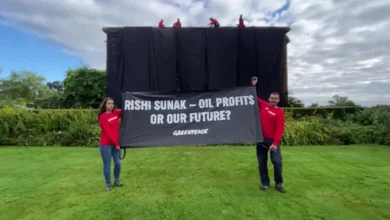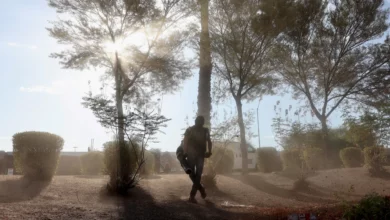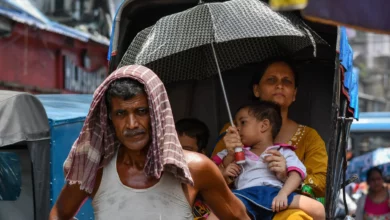On the final day of the United Nations climate talks in Cancun, Diana Pei Wu, a member of Grassroots Solutions for Climate Justice, made her way to the COP16 conference site as she had done every morning.
The routine was the same as always.
First, a 20-mile car ride from downtown Cancun takes her past rows of heavily armed soldiers and Mexican police to "Cancunmesse," a gleaming white building resembling an airplane hangar built on a secluded stretch of highway. Inside, a security guard scans a barcode on her credentials. Then she walks through a metal detector and passes her bag though an X-Ray machine. From there, she hops onto a bus waiting on the other side of the building, but not before she has her credentials scanned a second time. This UN-operated bus is the only way to reach the luxurious Moon Palace resort where the talks are being held and which has been completely barricaded off from the outside world. Once the bus arrives at the hotel it's just another metal detector, one more scan of her credentials and she is finally in.
The ordeal can take up to one and a half hours from start to finish.
While the process had been relatively seamless for Pei Wu all week, on the last day of the talks she was turned back at the first security checkpoint after the barcode scanner reacted to her credentials with an ominous beeping noise. Pei Wu soon found out her access to the UN summit had been revoked because of her association with a peaceful protest earlier in the week. In fact, she hadn't even taken part in the protest, she had just filmed it. But that didn't matter, the UN banned her anyway.
"We know that these are very political decisions," Pei Wu said. "The idea that it’s wrong to chant, that it’s wrong to walk together, en masse, seems to me a shutting down of free speech and the democratic processes, which the UN is supposed to represent."
Such was the atmosphere at the Cancun climate summit. A series of segregated, tightly controlled meeting spaces. A conference that purposefully made it difficult to convene. Delegates in one place, NGOs and civil society groups in another and outside grassroots activists kept farther away still, in Cancun proper.
"Civil society is shut out," said Kumi Naido, the executive director of Greenpeace International. "I’ve met government delegates who said, 'Oh, I would love to come for that side meeting…but it takes me 45 minutes to get from here to there and back.' So, there has been no real enabling environment created for civil society to be able to have access to delegates and to convey our concerns and our views and perspectives."
The UN climate talks came to a close early Saturday morning after 193 countries signed on to what has become known as the "Cancun Agreements." The deal commits all major economies to reduce their greenhouse gas emissions but does not lay out how far overall global emissions should be cut. According to the Guardian newspaper, researchers from the Climate Action Tracker said the current pledges would set the world on course to warm by 3.2 degrees Celsius, which would spell disaster for many of the world’s poorest countries that are most susceptible to climate disruption. The agreement does not include a commitment to extend the Kyoto Protocol–the only treaty that legally binds rich nations to cut their emissions–beyond 2012, when its first period expires.
"This UN process, has been going on forever, and it’s getting nowhere, and it’s not going to get anywhere substantive, until we have some power from the outside to push it," said Bill McKibben, a leading environmentalist. "At the moment, that power rests in the hands of the fossil fuel industry and their allies in governments around the world. And until we build some independent outside movement power to push back, then we’re going to get scraps from the table, at the very best."
But dissenting voices at the UN summit in Cancun were not welcome. New proposals by civil society groups were not seriously considered and grassroots voices were shut out. The few, small protests that took place inside the summit by credentialed groups were swiftly shut down by UN security.
"They’ve deliberately kept people away," said John Vidal, the environment editor at the Guardian newspaper who has been covering the UN climate talks for the past 20 years "There’s very little access, even for civil society groups, let alone the indigenous peoples and the marginalized peoples."
Tom Goldtooth, the executive director of the Indigenous Environmental Network and one of the most prominent North American indigenous activists attending the UN climate talks, had his credentials temporarily revoked and was blocked from entering the summit one day after he publicly criticized the UN process.
"I’ve seen this happen before, but never thought it would be happening to me," Goldtooth said. "Freedom of speech has been assassinated at this Cancun climate summit…and how ironic it is that indigenous peoples, who can teach humanity about how to survive climate catastrophe, are being kicked out."
In stark contrast to the UN talks inside the opulent Moon Palace hotel, peasant farmers, indigenous groups and social grassroots organizations from around the world gathered at a crumbling open-air sporting complex in one of the poorest neighborhoods of Cancun to take part in an alternative Global Forum for Life and Environmental and Social Justice organized by the international small farmers movement, La Via Campesina.
"Our goal is to tell the world that the strategies that the governments and these transnational corporations have presented for the climate change crisis are false," said Rogelio Alquisiras Burgos, a member of the National Union of Regional Autonomous Peasant Communities. "The villagers of the world are the ones most affected by global warming. We are the most affected by the loss of our harvests. We have to deal with the effects of hurricanes, floods, droughts and with the changing climate."
The UN climate talks will continue next year at the COP17 summit in Durban, South Africa. The battle is on for all voices to be heard.
Sharif Abdel Kouddous is a producer for the independent TV/radio show Democracy Now! Some of the material for this piece is drawn from interviews broadcast on the program.




